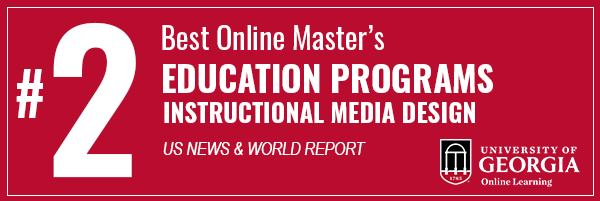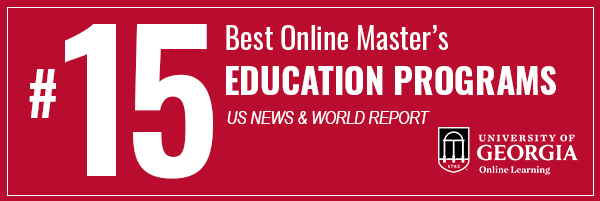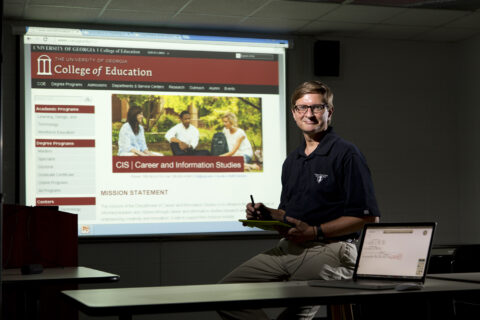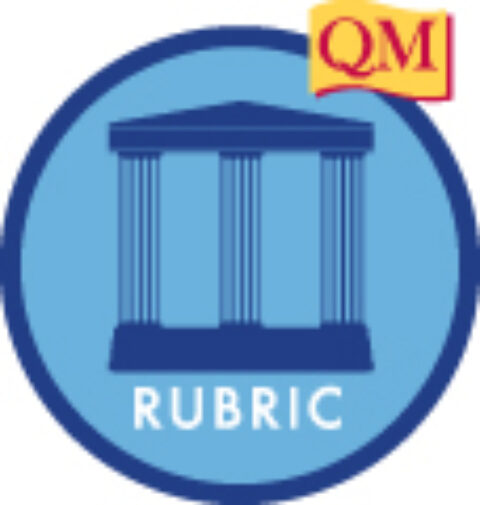Graduate Certificate in Instructional Technology for Teaching
Graduate Certificate in Instructional Technology for Teaching

I see technology as being a real key to improving the efficiency, the efficacy and the quality of the student teaching field experience.



Overview
Offered through the Mary Frances Early College of Education Learning, Design, and Technology (LDT) Program, the University of Georgia’s online Graduate Certificate in Instructional Technology for Teaching is designed to align with the Georgia Professional Standards Commission’s (GPSC) new certification for instructional technology. Students who earn this certificate will then be eligible for Instructional Technology Certification from the GPSC. Students may either be pursuing a graduate degree in another UGA program or department, or may apply to the graduate school for non-degree status. If you have an interest in using technology more effectively in your classrooms, this certificate is for you.
NOTE: If you are a teacher seeking Instructional Technology Certification in Georgia, please see our MEd and EdS degree offerings; both are approved by the Performance Standards Commission (PSC) and lead to certification. Visit the College of Education website for more information: https://coe.uga.edu/directory/programs/learning-design-technology
Accreditations
The University of Georgia is accredited by the Southern Association of Colleges and Schools Commission on Colleges (SACSCOC) to award baccalaureate, master’s, specialist, and doctoral degrees. The University of Georgia also may offer credentials such as certificates and diplomas at approved degree levels. Questions about the accreditation of the University of Georgia may be directed in writing to the Southern Association of Colleges and Schools Commission on Colleges at 1866 Southern Lane, Decatur, GA 30033-4097, by calling (404) 679-4500, or by using information available on SACSCOC’s website (www.sacscoc.org).
Admissions
Students who are not currently enrolled at UGA should apply to the graduate school for the Graduate Certificate program in Instructional Technology for Teaching and are not required to take entrance exams and submit letters of recommendation.
Currently, enrolled UGA students who choose to pursue this certificate should submit ITT Certificate Form, which includes the submission of a single-page Statement of Purpose. If admitted, you will be assigned an advisor to ensure successful enrollment in courses.
Application Checklist
- Application – Submit online to the Graduate School Admissions. Application fee: $75.
- Select Campus- Online
- Select Intended Program – CERG, Instructional Technology for Teaching (Career and Info Studies)[CERT_2ITT]
- Statement of purpose – Submit to the Graduate School online in your application.
- Transcripts – Submit unofficial transcripts from all institutions attended as part of the online application. Send official transcripts after you are offered admission.
International Applicants – must also submit TOEFL or IELTS scores
Application Deadlines
Domestic Applicants
- Fall: July 1
- Spring: November 15
- Summer: May 1
International Applicants
- Fall: April 15
- Spring: October 15
- Summer: February 15
Cost
Tuition & Fees
Tuition rates and student fees may change each year.
Based on the 2024-25 credit-hour cost, a person who had completed this program at the recommended pace would have paid $9,675 in tuition. Reference this sheet to identify the current credit hour rate for your program of interest.
Please use the Estimated Cost Calculator on the Bursar’s Office website to calculate one academic (Fall/Spring) year’s tuition.
This program is an E-Rate program, so choose “yes” for the E-Rate line item within the calculator.
Fees for those students enrolled in exclusively online programs are $422 per semester.
Potential additional costs include:
- Textbooks
- Exam proctoring fees
- Technology upgrades
The complete cost of attendance can be found at https://osfa.uga.edu/costs/.
Financial Aid
Visit the Office of Student Financial Aid for information about financial assistance.
Corporate Assistance
Consult your employer about the availability of tuition reimbursement or tuition assistance programs.
Military Assistance
Active-duty military, veterans, and military families should visit Veterans Educational Benefits to take full advantage of available financial assistance and educational benefits.
University System of Georgia Tuition Assistance Program (TAP)
The purpose of TAP is to foster the professional growth and development of eligible employees. For more information, see Tuition Assistance (refer to the Distance Learning section).
Technology Requirements
- Computer with current operating system (Windows, Mac, or Linux). Additional peripherals such as webcam, headphones, and microphone are required.
- High-speed internet access.
Curriculum
| Course ID | Course Title | Credit Hours |
| EDIT 6150E | Introduction to Digital Learning | 3 |
| EDIT 6320E | Technology Integration and Planning | 3 |
| EDIT 6400E | Emerging Approaches to Teaching, Learning, and Technology | 3 |
| EDIT 7500E | Project, Problem, and Place-Based Learning | 3 |
| EDIT 6600E | Diversity, Technology, and Learning | 3 |
If seeking Instructional Technology Certification from the state of Georgia, you will take the following additional course:
EDIT 7650E Capstone (3 credit hours)
NOTE: Student class scheduling is subject to course availability. All courses are offered at least once per year. Be sure to communicate with your academic advisor.
Additional information and disclosures regarding state licensure for professional practice in this field can be found at the UGA Licensure Disclosure Portal.
Faculty
News & Events
UGA faculty learn to apply the Quality Matters rubric to online courses
March 24, 2016Over 30 of the University of Georgia's faculty and staff who teach online courses participated in a Quality Matters workshop last semester offered through UGA's Office of Online Learning. Quality Matters is a faculty-centered, peer review process intended to promote the design and development of quality online courses, and the Applying the Quality Matters Rubric workshop introduces course designers to these standards.
Engaging in Sustainable Online Course Development
February 23, 2016The instructional design team at the Office of Online Learning takes pride in working with faculty to create online learning experiences that live up to the academic standards of the University of Georgia. We also consider how the environment we work in can support the continued offering of the courses we help develop. To this end, we encourage faculty to engage in sustainable course development practices for all online courses.
Two Online Professors Selected as Service Learning Fellows
February 9, 2016This year, the University of Georgia's Office of Service-Learning has selected three faculty members from the College of Education to participate in its yearlong Service-Learning Fellows program, two of whom teach in online degree programs.
Contact Information
Contact the online Learning Design Coordinator for answers to any additional questions you may have.
Contact us using the request for information form or call 706-452-7940.







